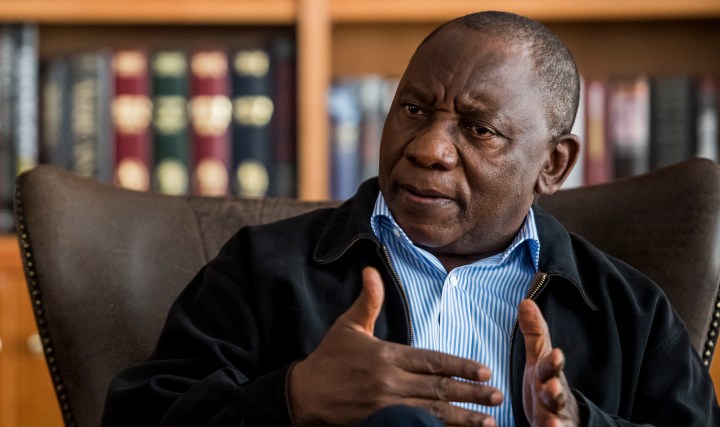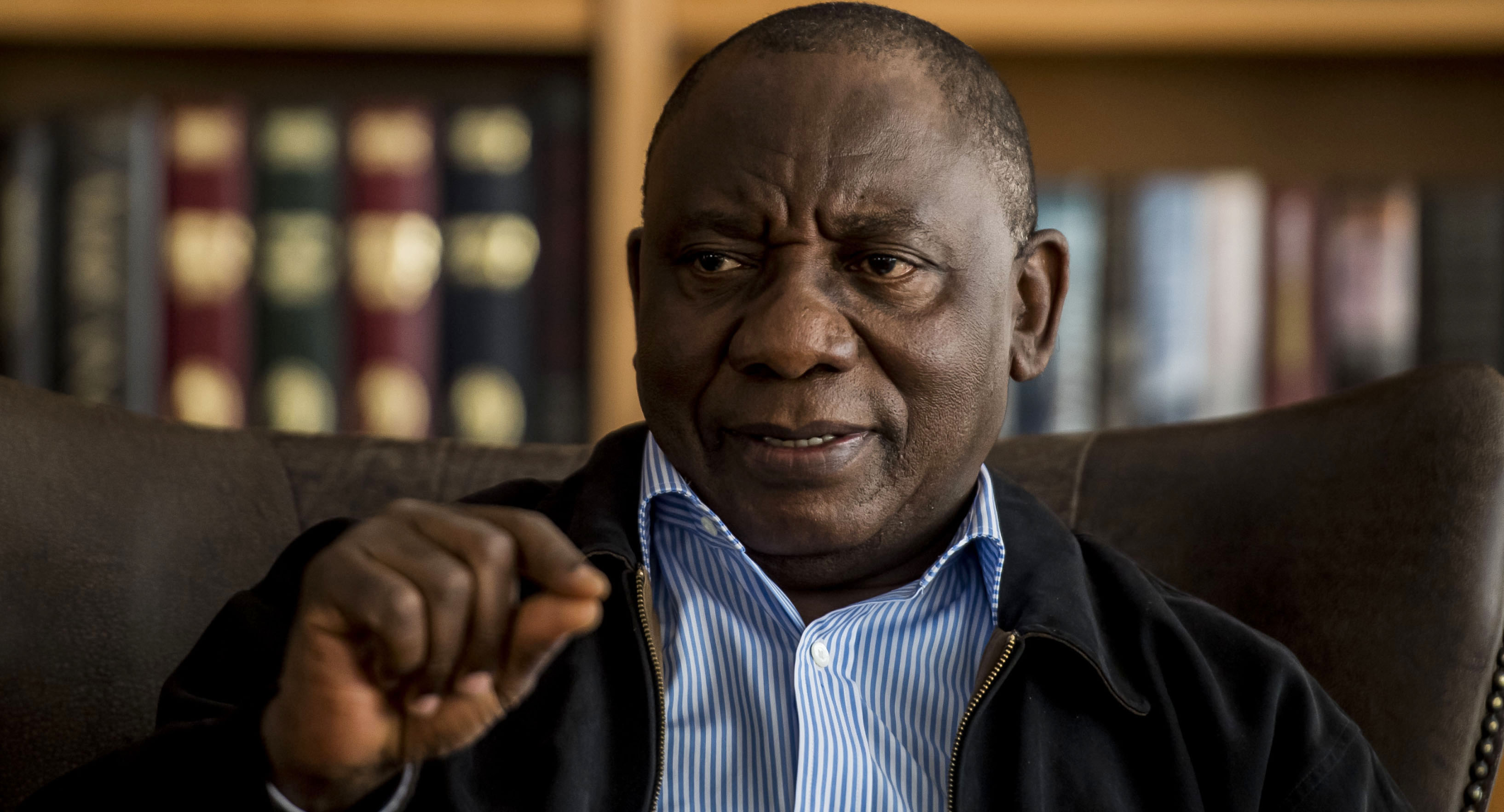2022 STATE OF THE NATION ADDRESS
South Africa, here’s what I’ve done for you lately, by President Ramaphosa

As President Cyril Ramaphosa prepares to take to the podium to deliver his sixth State of the Nation Address, Daily Maverick asked how much progress he has made in creating a modern and reformed state.
Ferial Haffajee asked the questions. The Presidency’s team answered.
Q: The Presidency is billed as being reformist and modernising. How successful has it been at these two imperatives?
A: President Ramaphosa has sought to rebuild the capacity of the state, end State Capture and corruption and undertake far-reaching economic reforms. Despite severe disruption caused by Covid, progress has been made in driving key reforms. Operation Vulindlela, a joint initiative of the Presidency and National Treasury, has played a role in driving structural reforms.
This has reinvigorated the reform agenda, with demonstrable progress in areas such as energy (through, for example, the raising of the licensing threshold for embedded generation projects to 100 MW) and transport (through the establishment of an independent National Ports Authority and the commitment to third-party access on the freight rail network). The aim of structural reforms is to modernise the economy.
To fight corruption, the President has:
- Stabilised the South African Revenue Service (SARS), the National Prosecuting Authority (NPA), the Hawks and the Public Investment Corporation.
- Supported the Commission of Inquiry into State Capture, immediately released the first two parts of its report.
- Established the Special Investigating Unit (SIU) Special Tribunal in 2019 to fast-track the recovery of state funds.
- Established the Health Sector Anti Corruption Forum.
- The Fusion Centre established in 2019 recovered over R3bn in criminal proceeds, including close to R700m of the recovered amounts relating to Covid-19 corruption.
- Authorised the online publication of all Covid-related procurement contracts, for the first time in South Africa.
South Africa’s energy system is undergoing the most extensive structural change since the formation of Eskom nearly 100 years ago.
Other innovations we have achieved include the e-Visa system, social relief of distress grant applications, vouchers for 50,000 farmers by WhatsApp, USSD and online. Over 300,000 school assistants were hired via SAYouth.mobi, a data-free mobile platform
We have prioritised important programmes. Gender-based violence now has a national strategy. There are commissions on climate change and 4IR and legislation for National Health Insurance (NHI) is coming up.
Q: How has Covid shaped this presidency? What have been the successes and failures?
A: The pandemic reversed many early gains in reviving growth and in innovation and agility. It has been the greatest external shock to our country in a century. The Economic Reconstruction and Recovery Plan is a bold response and we have learned that co-ordinating government services is vital.
President Ramaphosa helped establish the African Medical Supplies Platform, the first-ever for the continent. The Vaccine Acquisition Task Team has secured over 500 million vaccine doses for the continent. A step towards biotech sovereignty was achieved with the recent launch of the state-of-the-art vaccine manufacturing campus by NANT-SA.
The Presidency also counts as successes the rapid and decisive implementation of a lockdown in the early stages of the pandemic to allow health systems to prepare. This prevented the massive number of deaths that we saw in other parts of the world.

President Cyril Ramaphosa. The Presidency said the shortcoming in the response to the pandemic was large-scale corruption in the procurement of personal protective equipment. (Photo: Gallo Images / Rapport / Deon Raath)
We secured access to Covid-19 vaccines for South Africa less than four months after the first vaccines were made available globally within the context of rich-country hoarding. Aspen Pharmacare is the first pharmaceutical company on the continent to secure a licensing deal to produce Covid-19 vaccines. Regular addresses to communicate the risk-adjusted strategy has meant we can now reduce the risk outlook.
South Africa has dispensed the first large-scale digitally implemented social security measure in the history of democratic South Africa, which now reaches 10 million people. The private sector mobilised to establish the Solidarity Fund.
The shortcoming was the large-scale corruption in the procurement of personal protective equipment (PPE). Lessons have been learned, particularly with regard to vulnerabilities in emergency procurement regulations.
The trajectory of the pandemic changed often over the last two years, requiring an agility in strategy and decision-making. Government has had to balance concerns for human health against the economic impact of restrictions, and balance the education needs of learners, for example, against the safety of learners and educators. This has, at times, opened the government up for criticism that it was opening up the economy too slowly or too fast, imposing restrictions too late or unnecessarily.
Q: Employment is key to the presidential programme. I see success at public employment — the presidential youth employment stimulus, for example, but less success at increased employment in the private sector. Why is this?
A: Government recognises that private sector growth is the only long-term solution to unemployment. Governments cannot create jobs more efficiently and at greater scale than the private sector. The labour absorption capacity of the private sector far exceeds that of the state. This is particularly relevant within our current context where the public sector wage bill poses a serious threat to the fiscus.
Government wants to improve economic prospects primarily through the recovery plan, which includes structural and growth-enhancing reforms. This includes red tape reduction through Operation Vulindlela and support for SMEs because they play a vital role in job creation. The annual investment conferences have generated some R770-billion in investment commitments, with almost R300-billion having been invested so far.
Shoprite recently announced it will prioritise locally produced sugar for sale in its stores. This is an outcome of the sugar industry masterplan. Others are being implemented. While some sectors such as mining and agriculture have recovered to pre-pandemic levels of employment, other sectors such as tourism and hospitality will take time to recover fully.
Q: Why does it take so long to move from idea (vision) to action — from the Lanseria Smart City to police reform to emergency and green energy procurement? Right now, the country is once again suffering from rolling blackouts. What is it that squealing pundits like me don’t understand?
A: Achieving higher rates of growth and rebuilding the state requires complex and difficult institutional reforms, reversing almost a decade of stagnant growth and the devastating impact of State Capture. The foundations have been laid for rapid progress during the year ahead.
Capable management has been installed in key institutions like SARS, the NPA, Eskom and Transnet to tackle corruption and accelerate long-delayed economic reforms like the unbundling of Eskom and the auction of high-demand spectrum.
The Presidency drives initiatives through a Project Management Office. With the Infrastructure and Investment Offices, they drive progress on priorities identified by the President.
Dysfunction in a number of municipalities also directly impacts project preparation and implementation, particularly in infrastructure development. DM
[hearken id=”daily-maverick/9072″]
















 Become an Insider
Become an Insider
It is interesting that both the media and the state have been relatively quiet about the excellent performance of the SA stock market in the last two years. It had been in the doldrums since about 2016 and dipped dramatically at the start of covid. Since then, however, it has been climbing rapidly and is currently at record highs. Let’s hope this predicts good things to come in private sector growth, and thus employment growth.
The ‘excellent performance’ needs to be measured in dollar terms to get the real truth.
Oh please… when the cure is slower acting than the disease itself, then the infected will die!
Once again… GROW A PAIR!
Another confirmation of the severe disconnect between government and the rest of us. They claim progress and we experience the consequences of the riots/insurrection they were totally incapable to control and are still unwilling to arrest the masterminds.
More hogwash from a the leader of a failed gangster party…
Unfortunately , despite all these fine words , the state of the nation is not exactly rosy at this moment.The country has not yet recovered from own goal tragedies such as the July violence, fomented by the ANC’s own , and left unpunished. As for rolling out of the vaccines, I personally had great difficulty in being vaccinated ,and finally achieved this eight months into 2021. The levels of poverty and joblessness are quite shocking, and as for the devastation of the municipalities and most state owned enterprises, that is another ugly story. Facts are facts and no amount of obfuscation can explain them away.
All the Presidents Men talk rubbish.
“It has been the greatest external shock to our country in a century.”
…which pales into insignificance when compared to the greatest internal shock to our country in a century; the ANC.
Lousy questions. Key questions not there… If all this wonderful stuff is going on, why is confidence in your govt and the country on the floor, why is our economic growth totally sub par, and why are the wealthy leaving the country at record rates?
What evidence do you have that the lockdowns saved a single life (let alone the millions claimed) and why did the police and army do zero to stop the looting?
Then explain exactly how EWC will create jobs instead of the obvious consequence of destroying them.
And why a NHS will not lead to a flood of doctors leaving the country?
And why every key decision taken by the ANC is actually a blunder?